模块1 Unit 1 School life Grammar and usage(2)课件(43张PPT)
文档属性
| 名称 | 模块1 Unit 1 School life Grammar and usage(2)课件(43张PPT) |
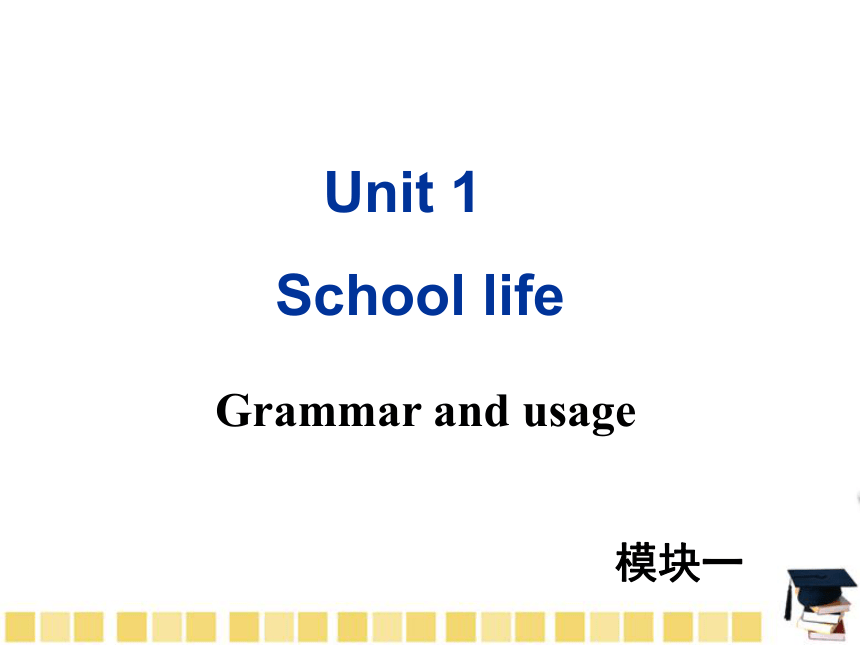
|
|
| 格式 | zip | ||
| 文件大小 | 2.8MB | ||
| 资源类型 | 教案 | ||
| 版本资源 | 牛津译林版 | ||
| 科目 | 英语 | ||
| 更新时间 | 2019-08-23 00:00:00 | ||
图片预览

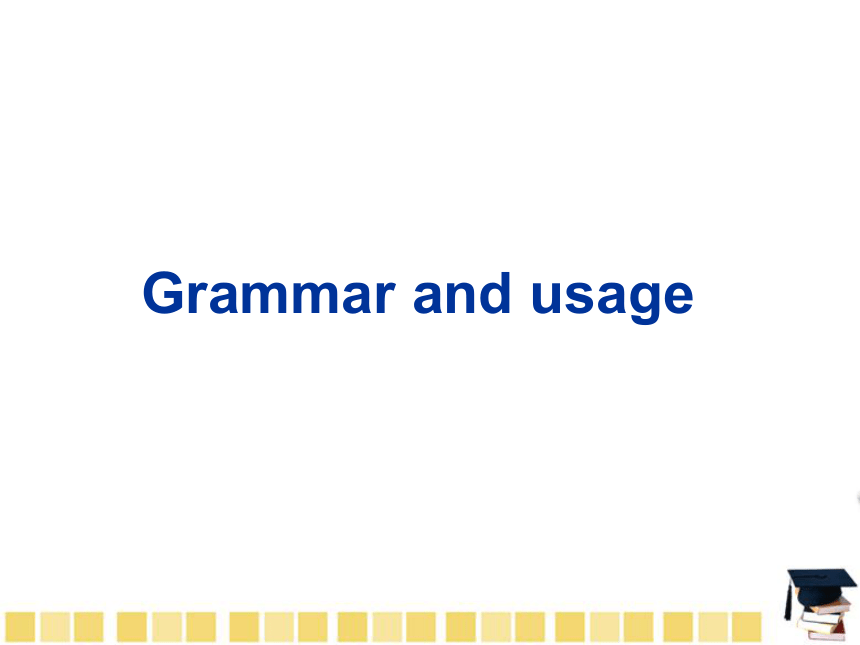
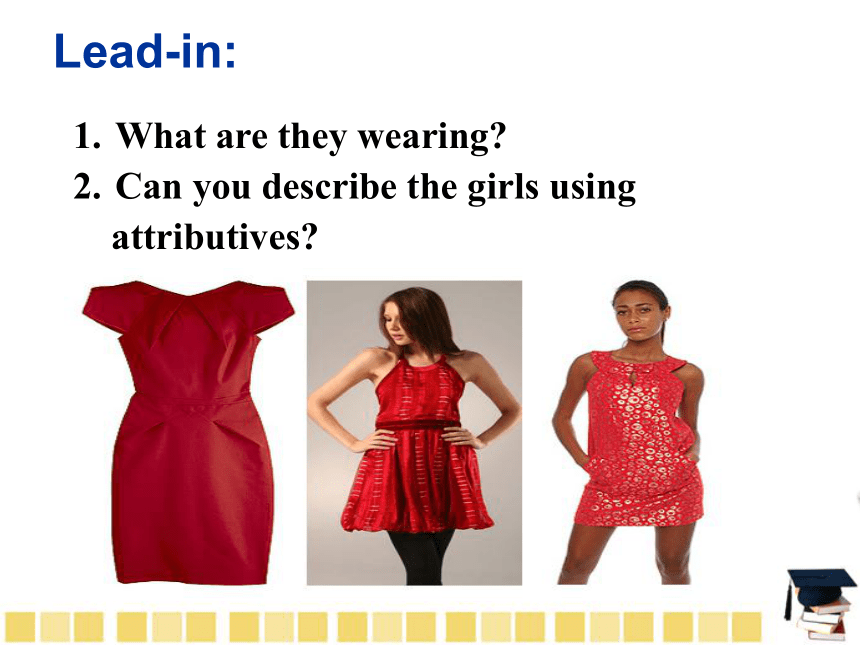
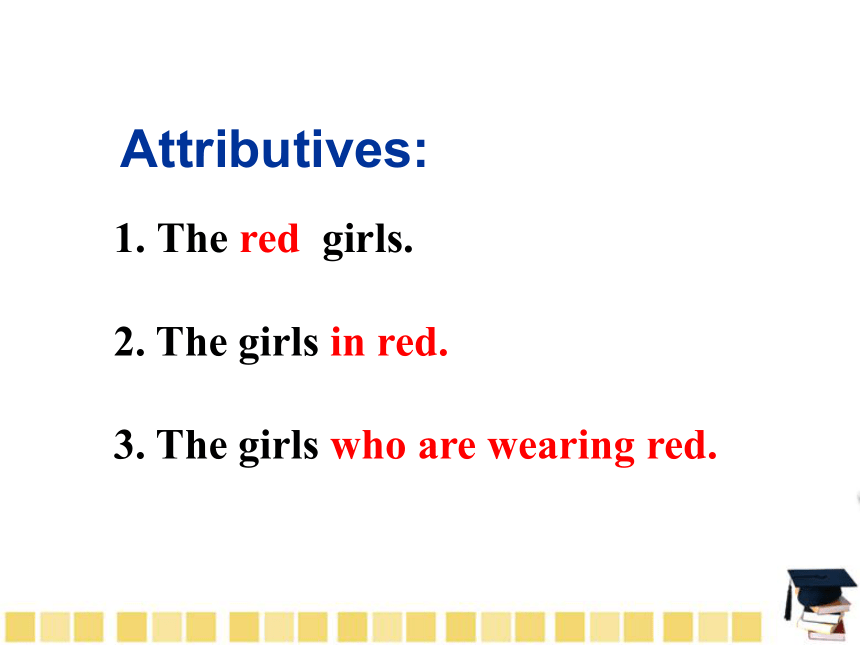
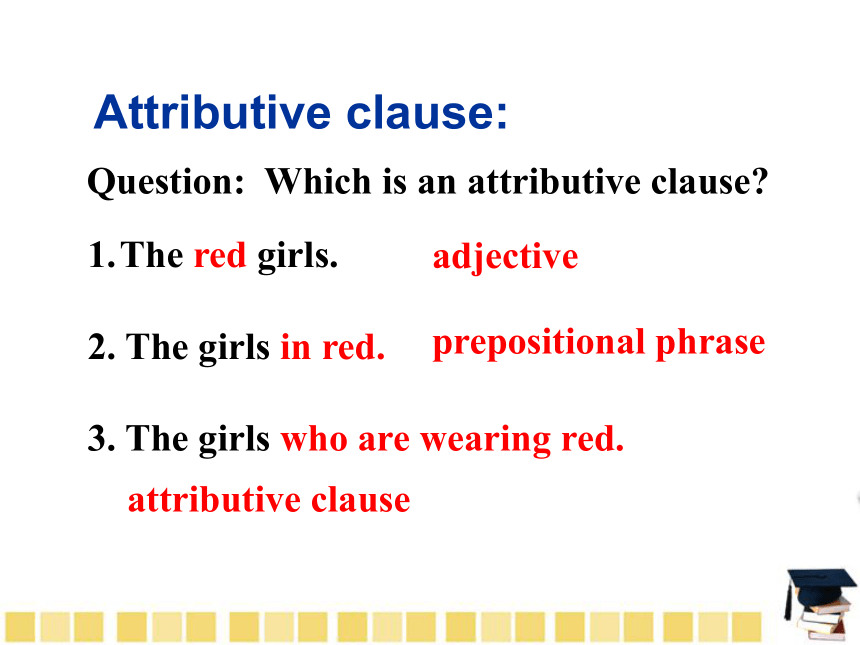
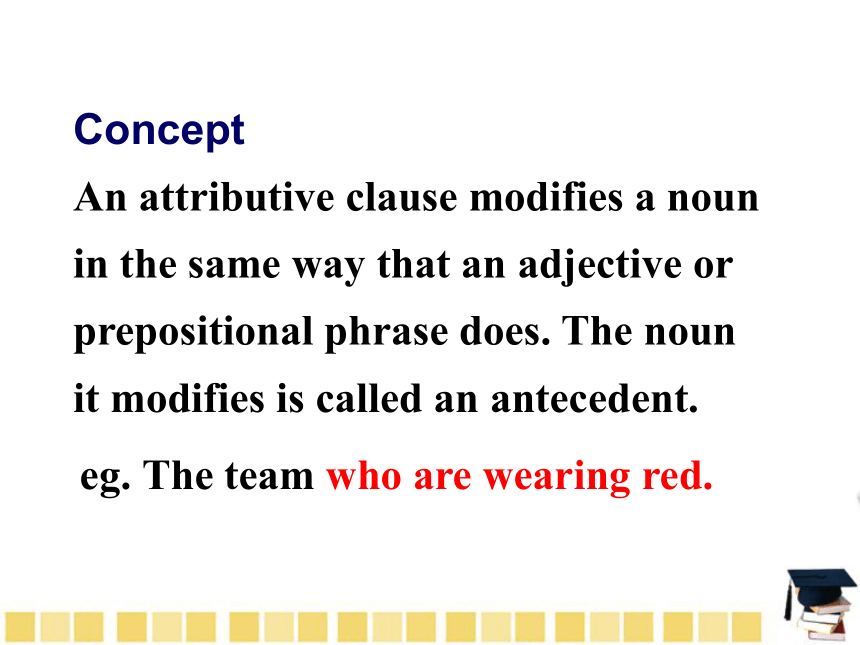
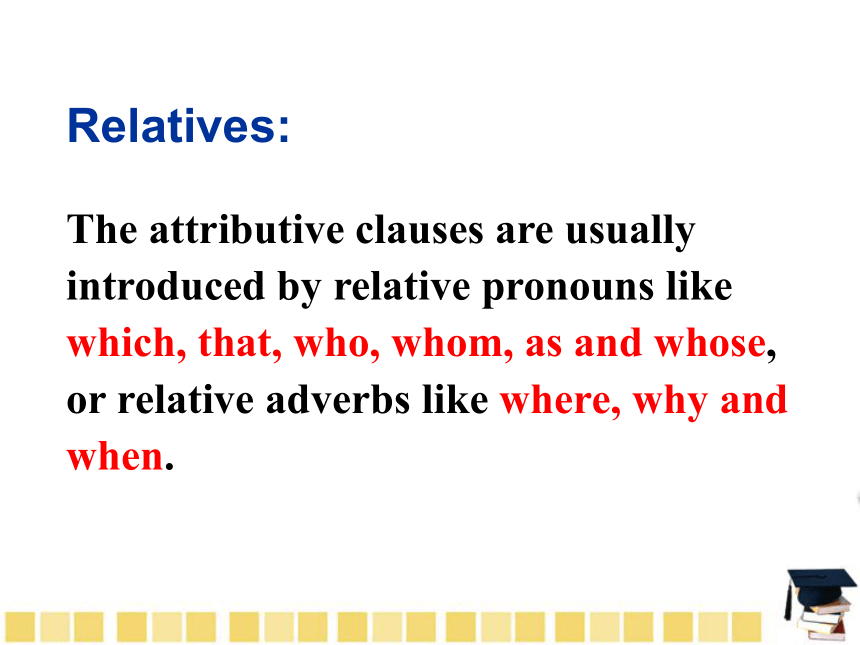
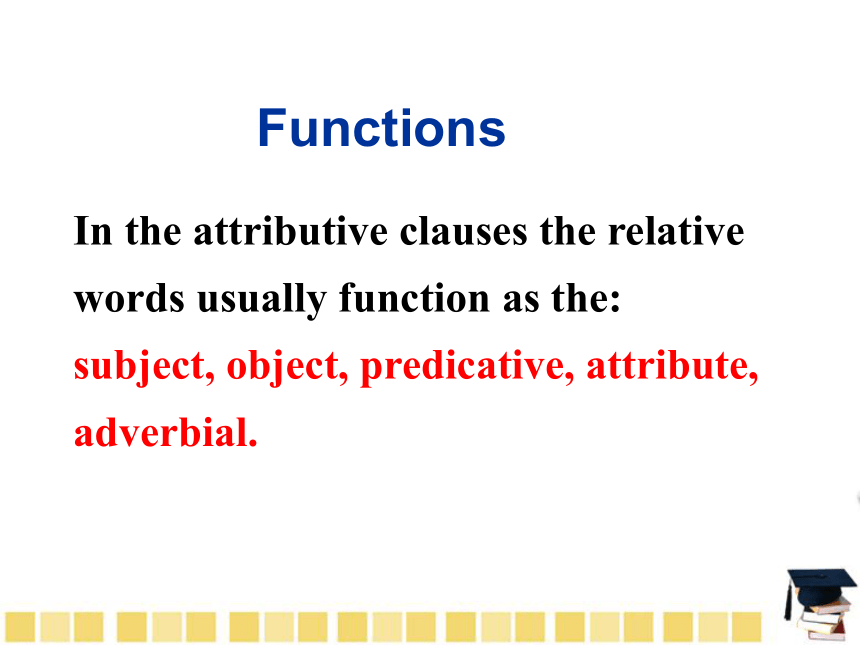
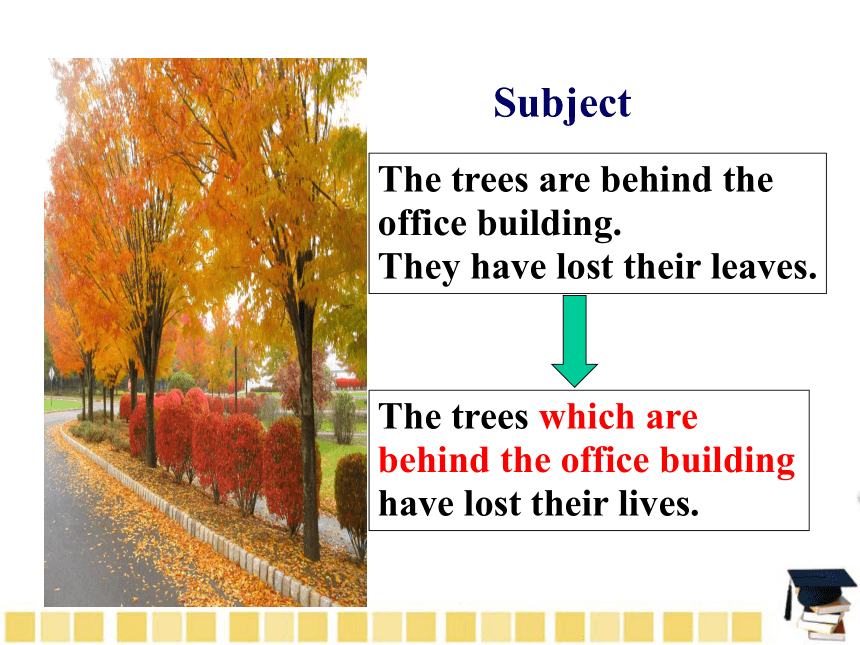
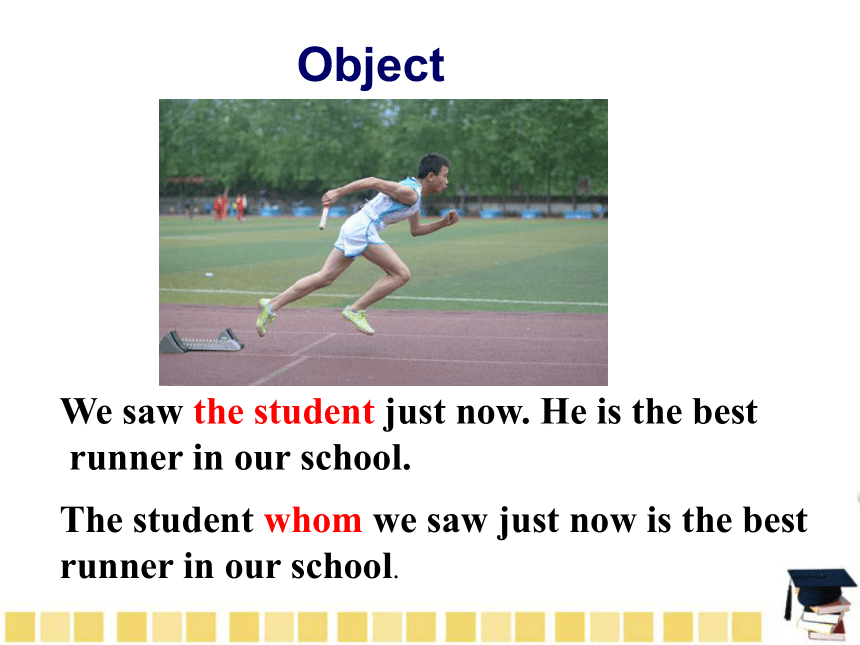
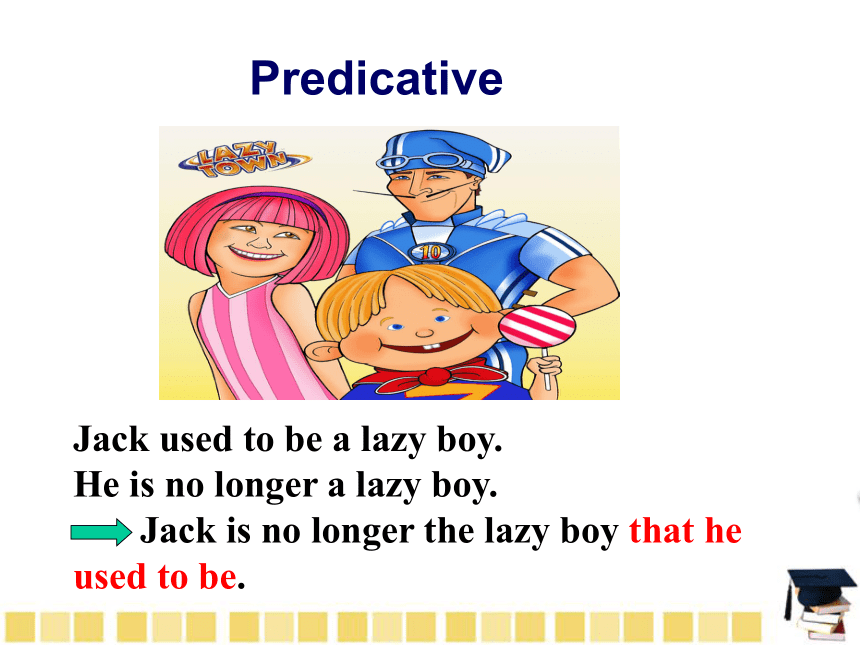
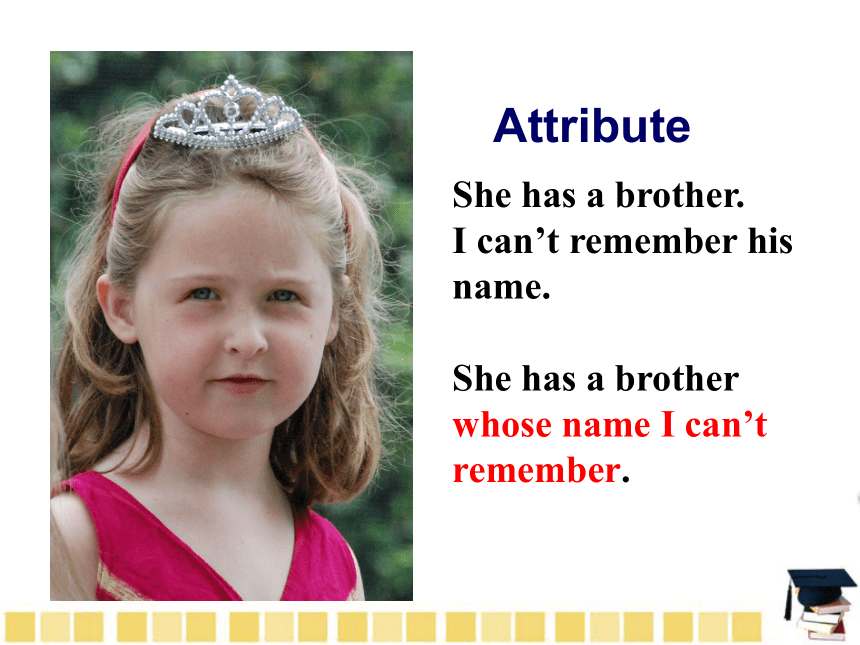
文档简介
课件43张PPT。 Unit 1
School lifeGrammar and usage模块一Grammar and usageLead-in: What are they wearing?
Can you describe the girls using
attributives? The red girls.
2. The girls in red.
3. The girls who are wearing red.Attributives:Attributive clause:Question: Which is an attributive clause?The red girls.
2. The girls in red.
3. The girls who are wearing red.prepositional phrase attributive clauseadjectiveConcept
An attributive clause modifies a noun in the same way that an adjective or prepositional phrase does. The noun it modifies is called an antecedent.eg. The team who are wearing red.Relatives: The attributive clauses are usually introduced by relative pronouns like which, that, who, whom, as and whose, or relative adverbs like where, why and when.In the attributive clauses the relative words usually fun_ction as the:
subject, object, predicative, attribute, adverbial. FunctionsThe trees are behind the office building.
They have lost their leaves. SubjectThe trees which are behind the office building have lost their lives. Object We saw the student just now. He is the best
runner in our school.The student whom we saw just now is the best
runner in our school.Jack used to be a lazy boy.
He is no longer a lazy boy.
Jack is no longer the lazy boy that he used to be. Predicative She has a brother.
I can’t remember his name.
She has a brother whose name I can’t remember. Attribute The school is in Shenzhen.
He studied in the school.
The school where he studied is in Shenzhen. Adverbial Read the article from a UK school newspaper. Underline the attributive clauses you find in the article. David was one of the most helpful students
that we ever had .
In 2004, he went to Oxford University
where he became interested in Chinese culture.
Paragraph 1 Some of the cities in China which he likes
most are Beijing,
Most of the students whom he taught have
become his friends.Paragraph 2Paragraph 3 Some of the books were gifts that he got
from his Chinese friends and students.
The paintings that David donated to the
school are being shown in the exhibition
room.关系代词 that, which, who, whom 和 whose 的用法 关系代词who 指人,作主语或宾语(作宾语常可省略);whom指人,作宾语;whose 指人或物,作定语; which 指物,作主语、宾语、表语; that 指人或物, 作主语、宾语、表语;as 指人或物,作主语、表语,as的作用接近who和which; 关系代词用法人/物 主/宾 主/宾 主/宾 宾 定 人 人人/物 物 The man _________stands there is Tom.
The girl ____________I met is Ms Li.
The boy ________watch was lost is Tom.
The book _________ lies on the desk is his.
The pen ___________ you bought is good.
The magazine ________cover is red is
nice. who/that(whom/that)whosewhich/that(which/that)whoseExercise : I. That 和 which以下情况,引导词用that,不用which。
1. 先行词为不定代词 everything,something,nothing,anything 等修饰时,常用关系代词 that 来引导定语从句。Note: 2. 先行词被all, few, little, much, every, some, no等词修饰或被the only, the very, the same, the last 等限定词修饰时,用关系代词 that 引导定语从句。例如:
These are all the pictures that I have seen.
这是我看的所有照片。
This is the very dictionary that is of great help.
这就是那本对我帮助很大的字典。3. 先行词前有形容词最高级、序数词修饰时,用关系代词 that 引导定语从句。如:
The first thing that they should do is to work out a plan.
他们应该做的第一件事是订个计划。
Newton was one of the greatest men that ever lived.
牛顿是世界上最伟大的人物之一。4. 先行词同时指人和物时,用that。如:
We talked about the things and persons that we saw in the movie.
我们谈论了我们在这部电影中所见的人和事。
Look at the man and his donkey that are walking up the street.
瞧瞧那个沿街走过来的男人和他的驴子。5. 当先行词前面有who, which等疑问代词时用that。如:
Which is the book that you want?
哪本是你想要的书? Who is the man that is standing by the gate? 站在大门旁边的那个男人是谁?Exercise: This is the best film _______we’ve seen.
That is the last lesson ______I gave you.
This is the very book ______he is looking after.
This is just the coat ______ color is blue.
That is the right place ______ they study.
I still remember the schools and boys ______ I met here.(that)(that)(that)whosewhere(that)7. Everything ______ you said is true.
8. Which is the book _____ you want?
9. Who is the girl ______ sits there.
10. All _____ he said is true.
11. All _____ is said by him is true.(that)(that)that(that)thatLanguage points 1. Former student returns from China
以前的学生从中国归来
former adj. 以前的
e.g. By studying old photos of the former
Amber Room, they have made the new
one look like the old one.
通过研究琥珀屋原来的照片,他们建造
的新琥珀屋样子和旧的看起来非常像。 2. David was one of the most helpful students that we ever had.
戴维是我们遇到过的最乐于助人的学生之一。
本句为主从复合句。that引导定语从句,且在从句中作宾语。
注意:当先行词是序数词、形容词的最高级或先行词被序数词或形容词的最高级修饰时,定语从句只能用that 而不用which引导。
e.g. The first song that I learned will never be forgotten.
我永远不会忘记我学的第一首歌。3. After graduating from university, he went to China to study Chinese at Beijing Language and Culture University.
大学毕业后,他去了中国,在北京语言文化大学学习中文。
graduate vi. 毕业
n. [C] 毕业生
e.g. My brother is a graduate of Yale.
我的哥哥是耶鲁大学的毕业生。
graduate from 从…毕业。
He graduated from Oxford.
他毕业于牛津大学。
4. Two years later, he was able to speak fluent Chinese.
两年后他就能讲一口流利的中文了。
fluent adj. 流利的
e.g. Ramon is fluent in English and French.
拉蒙的英语和法语都讲得很流利。
扩展:fluently adv. 流利地;流畅地5. Upon finishing his studies, he started travelling in China.
学习一结束,他就开始游历中国。
upon/on+n./doing sth. 表示“一…就…”,句中 upon finishing his studies 相当于 as soon as he finished his studies。
e.g. Upon arriving at the school, he telephoned me.
他一到学校就给我打电话了。
On hearing the good news, my sister jumped with joy.
一听到这个好消息,我妹妹高兴地跳了起来。6. In China he developed an interest in teaching English to Chinese students.
在中国他对教中国学生英语产生了兴趣。
develop an interest 对……产生兴趣
e.g. Under the help of my teacher, I began to develop an interest in Chinese.
在老师的帮助下,我开始对汉语产生了兴趣。7. He donated most of them to our school library.
他把其中的大部分都捐给了我们学校的图书馆。
donate vt. 捐赠
e.g. Local people lined up to donate biood for the brave girl.
当地群众排队给这位勇敢地姑娘献血。
donate sth. to sb./sth. 把某物捐给某人/某物
e.g. She donated her books to the library.
她把她的书捐给了图书馆。 扩展:donation n.[ U, C] 捐赠;捐赠物
e.g. Would you like to make a donation?
你愿意捐赠吗?8. The paintings that David donated to the school are being shown in the exhibition room.
戴维捐给学校的绘画作品正在展览室展出。 本句中that引导的定语从句在从句中作宾语,指代先行词paintings。主句谓语动词are being shown 采用现在进行时的被动语态(构成形式为am/are/is+being+过去分词),表示正在发生的被动动作。
e.g.---Are you about to have dinner?
---Yes, it is being served in the dining-room.
你们是要准备吃饭吗?
是的,餐厅里正在上菜。9. Teachers and students at our school wish to thank David for his kindness.
我们学校的师生都想对戴维的善意表示感谢。
kindness n. [U] 善意;善良;好意
e.g. She was known to all for her kindness.
她的仁慈人人皆知。
归纳:sadness 悲伤 brightness 明亮
happiness 幸福 correctness 正确
selfishness 自私 darkness 黑暗
sickness 生病 usefulness 有用10. He will make a speech about his splendid experiences in China.
他将就他在中国极棒的经历发表演讲。
splendid adj. 极佳的;非常好的
e.g. What a splendid idea!
这主意棒极了!
We’ve all had a splendid time.
我们大家都玩得很开心。
联想:excellent adj. 极好的,卓越的
outstanding adj. 杰出的,出色的Homework Review the attributive clauses and
relative pronouns.
School lifeGrammar and usage模块一Grammar and usageLead-in: What are they wearing?
Can you describe the girls using
attributives? The red girls.
2. The girls in red.
3. The girls who are wearing red.Attributives:Attributive clause:Question: Which is an attributive clause?The red girls.
2. The girls in red.
3. The girls who are wearing red.prepositional phrase attributive clauseadjectiveConcept
An attributive clause modifies a noun in the same way that an adjective or prepositional phrase does. The noun it modifies is called an antecedent.eg. The team who are wearing red.Relatives: The attributive clauses are usually introduced by relative pronouns like which, that, who, whom, as and whose, or relative adverbs like where, why and when.In the attributive clauses the relative words usually fun_ction as the:
subject, object, predicative, attribute, adverbial. FunctionsThe trees are behind the office building.
They have lost their leaves. SubjectThe trees which are behind the office building have lost their lives. Object We saw the student just now. He is the best
runner in our school.The student whom we saw just now is the best
runner in our school.Jack used to be a lazy boy.
He is no longer a lazy boy.
Jack is no longer the lazy boy that he used to be. Predicative She has a brother.
I can’t remember his name.
She has a brother whose name I can’t remember. Attribute The school is in Shenzhen.
He studied in the school.
The school where he studied is in Shenzhen. Adverbial Read the article from a UK school newspaper. Underline the attributive clauses you find in the article. David was one of the most helpful students
that we ever had .
In 2004, he went to Oxford University
where he became interested in Chinese culture.
Paragraph 1 Some of the cities in China which he likes
most are Beijing,
Most of the students whom he taught have
become his friends.Paragraph 2Paragraph 3 Some of the books were gifts that he got
from his Chinese friends and students.
The paintings that David donated to the
school are being shown in the exhibition
room.关系代词 that, which, who, whom 和 whose 的用法 关系代词who 指人,作主语或宾语(作宾语常可省略);whom指人,作宾语;whose 指人或物,作定语; which 指物,作主语、宾语、表语; that 指人或物, 作主语、宾语、表语;as 指人或物,作主语、表语,as的作用接近who和which; 关系代词用法人/物 主/宾 主/宾 主/宾 宾 定 人 人人/物 物 The man _________stands there is Tom.
The girl ____________I met is Ms Li.
The boy ________watch was lost is Tom.
The book _________ lies on the desk is his.
The pen ___________ you bought is good.
The magazine ________cover is red is
nice. who/that(whom/that)whosewhich/that(which/that)whoseExercise : I. That 和 which以下情况,引导词用that,不用which。
1. 先行词为不定代词 everything,something,nothing,anything 等修饰时,常用关系代词 that 来引导定语从句。Note: 2. 先行词被all, few, little, much, every, some, no等词修饰或被the only, the very, the same, the last 等限定词修饰时,用关系代词 that 引导定语从句。例如:
These are all the pictures that I have seen.
这是我看的所有照片。
This is the very dictionary that is of great help.
这就是那本对我帮助很大的字典。3. 先行词前有形容词最高级、序数词修饰时,用关系代词 that 引导定语从句。如:
The first thing that they should do is to work out a plan.
他们应该做的第一件事是订个计划。
Newton was one of the greatest men that ever lived.
牛顿是世界上最伟大的人物之一。4. 先行词同时指人和物时,用that。如:
We talked about the things and persons that we saw in the movie.
我们谈论了我们在这部电影中所见的人和事。
Look at the man and his donkey that are walking up the street.
瞧瞧那个沿街走过来的男人和他的驴子。5. 当先行词前面有who, which等疑问代词时用that。如:
Which is the book that you want?
哪本是你想要的书? Who is the man that is standing by the gate? 站在大门旁边的那个男人是谁?Exercise: This is the best film _______we’ve seen.
That is the last lesson ______I gave you.
This is the very book ______he is looking after.
This is just the coat ______ color is blue.
That is the right place ______ they study.
I still remember the schools and boys ______ I met here.(that)(that)(that)whosewhere(that)7. Everything ______ you said is true.
8. Which is the book _____ you want?
9. Who is the girl ______ sits there.
10. All _____ he said is true.
11. All _____ is said by him is true.(that)(that)that(that)thatLanguage points 1. Former student returns from China
以前的学生从中国归来
former adj. 以前的
e.g. By studying old photos of the former
Amber Room, they have made the new
one look like the old one.
通过研究琥珀屋原来的照片,他们建造
的新琥珀屋样子和旧的看起来非常像。 2. David was one of the most helpful students that we ever had.
戴维是我们遇到过的最乐于助人的学生之一。
本句为主从复合句。that引导定语从句,且在从句中作宾语。
注意:当先行词是序数词、形容词的最高级或先行词被序数词或形容词的最高级修饰时,定语从句只能用that 而不用which引导。
e.g. The first song that I learned will never be forgotten.
我永远不会忘记我学的第一首歌。3. After graduating from university, he went to China to study Chinese at Beijing Language and Culture University.
大学毕业后,他去了中国,在北京语言文化大学学习中文。
graduate vi. 毕业
n. [C] 毕业生
e.g. My brother is a graduate of Yale.
我的哥哥是耶鲁大学的毕业生。
graduate from 从…毕业。
He graduated from Oxford.
他毕业于牛津大学。
4. Two years later, he was able to speak fluent Chinese.
两年后他就能讲一口流利的中文了。
fluent adj. 流利的
e.g. Ramon is fluent in English and French.
拉蒙的英语和法语都讲得很流利。
扩展:fluently adv. 流利地;流畅地5. Upon finishing his studies, he started travelling in China.
学习一结束,他就开始游历中国。
upon/on+n./doing sth. 表示“一…就…”,句中 upon finishing his studies 相当于 as soon as he finished his studies。
e.g. Upon arriving at the school, he telephoned me.
他一到学校就给我打电话了。
On hearing the good news, my sister jumped with joy.
一听到这个好消息,我妹妹高兴地跳了起来。6. In China he developed an interest in teaching English to Chinese students.
在中国他对教中国学生英语产生了兴趣。
develop an interest 对……产生兴趣
e.g. Under the help of my teacher, I began to develop an interest in Chinese.
在老师的帮助下,我开始对汉语产生了兴趣。7. He donated most of them to our school library.
他把其中的大部分都捐给了我们学校的图书馆。
donate vt. 捐赠
e.g. Local people lined up to donate biood for the brave girl.
当地群众排队给这位勇敢地姑娘献血。
donate sth. to sb./sth. 把某物捐给某人/某物
e.g. She donated her books to the library.
她把她的书捐给了图书馆。 扩展:donation n.[ U, C] 捐赠;捐赠物
e.g. Would you like to make a donation?
你愿意捐赠吗?8. The paintings that David donated to the school are being shown in the exhibition room.
戴维捐给学校的绘画作品正在展览室展出。 本句中that引导的定语从句在从句中作宾语,指代先行词paintings。主句谓语动词are being shown 采用现在进行时的被动语态(构成形式为am/are/is+being+过去分词),表示正在发生的被动动作。
e.g.---Are you about to have dinner?
---Yes, it is being served in the dining-room.
你们是要准备吃饭吗?
是的,餐厅里正在上菜。9. Teachers and students at our school wish to thank David for his kindness.
我们学校的师生都想对戴维的善意表示感谢。
kindness n. [U] 善意;善良;好意
e.g. She was known to all for her kindness.
她的仁慈人人皆知。
归纳:sadness 悲伤 brightness 明亮
happiness 幸福 correctness 正确
selfishness 自私 darkness 黑暗
sickness 生病 usefulness 有用10. He will make a speech about his splendid experiences in China.
他将就他在中国极棒的经历发表演讲。
splendid adj. 极佳的;非常好的
e.g. What a splendid idea!
这主意棒极了!
We’ve all had a splendid time.
我们大家都玩得很开心。
联想:excellent adj. 极好的,卓越的
outstanding adj. 杰出的,出色的Homework Review the attributive clauses and
relative pronouns.
